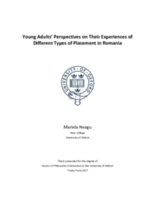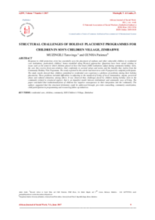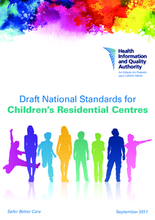Displaying 191 - 200 of 377
This article examines the practice of child-centered principles in the UK child protection and public child law systems.
This article presents the findings of the Questionnaire to Assess Needs of Children in Care (QANCC), a tool designed to gather children's direct input on the management of Udayan Care's care homes in India.
This qualitative study explored youth participation from the perspectives of 42 primary foster youth advisory boards facilitators in 34 states in the USA.
This study explores the childhood experiences and transitions to adulthood of 39 Romanian care leavers and adoptees, born around 1989 - 1990.
This podcast gives listeners an overview of how Arizona Kinship Support Services implements the Family Group Conference (FGC) model.
This rapid review from Coram Voice contributes to the understanding of care leavers’ experiences and is also the first stage in a project to develop a survey of care leavers’ subjective well-being, according to young people’s own evaluations of how they feel about their lives.
Increased attention on the situations of unaccompanied refugee minors living in Europe has recently begun to include their voices and perspectives. This article focuses on the micro to macro contexts which give rise to their voices and explores the multiple features of voice.
This study evaluates the Youth Initiated Mentoring (YIM) program, which allows youth with complex needs to nominate a mentor from their own social network to collaborate with care professionals and their families as an alternative to out-of-home placement.
This study observed the challenges experienced by children living in SOS Children's Village Bindura, Zimbabwe during a Community Holiday Visit Programme.
Ireland's Health Information and Standards Directorate has launched a public consultation on the Draft National Standards on Children's Residential Care. Once finalized, the Standards will provide a framework for the ongoing development of child-centred and effective services for children living in residential care centres. This document contains the preceding Draft Standards, eligible for feedback through 02 November 2017.




